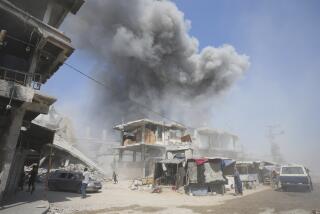Won’t Interfere in Refugee Aid, Iraqis Indicate
WASHINGTON — Iraqi diplomats here and at the United Nations assured U.S. officials Wednesday that Baghdad will not interfere with efforts to aid Kurdish refugees, but major questions persisted about how the Bush Administration’s new aid plan will be carried out.
In Baghdad, Iraqi Foreign Minister Ahmed Hussein Khudayer issued a statement complaining that the movement of troops into northern Iraq to protect the refugees is “unnecessary” and “a continuation of the policy of intervention in Iraq’s internal affairs.”
But in a meeting at the State Department, Iraq’s senior diplomat in Washington indicated that his government would cooperate.
“They’re not happy about it, but they’re resigned,” said a State Department official.
Iraqi acquiescence would eliminate one major concern of Administration planners, but many other issues remain. By attempting to set up protected refugee areas inside a sovereign country, the Administration is acting without precedent, said Brian Urquhart, the former undersecretary general of the United Nations. “I can’t think of an equivalent,” he said.
And Administration officials conceded that the massive operation is largely being created on the fly, with many major issues still unresolved.
Bush, according to one Administration official, “got on the phone” with other leaders Tuesday and developed an overall plan. By the time he announced the plan at a press conference Tuesday evening, the official added, “he had an outline.” But 24 hours later, officials were still scrambling.
One problem involves the legal authority for the U.S. action--an issue that many Americans brush aside but one that sets off alarms in many foreign capitals.
In Paris, where he met with French President Francois Mitterrand, U.N. Secretary General Javier Perez de Cuellar appeared to question the validity of U.S. officials’ claims that they have legal authority to send troops into northern Iraq.
The presence of foreign military personnel in Iraq “poses a problem” from a legal standpoint, Perez de Cuellar said, even if “from the moral and humanitarian point of view” there is “no difficulty.”
“If it is a military presence under the auspices of the United Nations, it is necessary to obtain the approval of the Security Council,” Perez de Cuellar said.
But the Administration is determined to avoid returning to the Security Council, where any new resolution would be subject to a likely veto from China, whose officials worry that the sort of international effort now being mounted to protect the Kurds could one day be applied to protect rebellious Tibetans.
The Soviet Union, which also has many restive ethnic minority regions, indicated similar concerns last week. On Wednesday, however, a Soviet spokesman indicated general support for Bush’s move, saying that Soviet President Mikhail S. Gorbachev is “thinking along the same lines” as Bush.
White House spokesman Marlin Fitzwater admitted that officials fear they might not be able to prevail if the matter comes to a U.N. vote. The United States believes that it needs no new authority, he said, and “the first rule is, if you don’t need it, don’t ask.”
A second problem is how to go about getting the United Nations to take responsibility for the camps, something that Bush said he would like to see happen “as soon as possible.”
U.N. officials are currently in Baghdad negotiating with the Iraqis over the terms of an agreement that would allow the world body to run refugee camps in Iraqi territory. Despite some hitches, they expect to have an agreement within a few days. With an agreement from Baghdad in hand, U.N. humanitarian teams would be able to work on Iraqi territory and could take over the job of actually running the camps.
But turning over the job of protecting the refugees--and thereby allowing U.S. troops to end their latest involvement in Iraq--is likely to be far more difficult, officials said.
Administration lawyers argue that the existing U.N. resolution setting up a peacekeeping force for southern Iraq might be stretched to cover a similar U.N. force for northern Iraq. But even if that can be done, the United Nations in the past “has been extremely leery of involving peacekeeping forces in internal situations,” Urquhart said. “If the Iraqis were to object, I doubt anyone would be for it.”
U.N. peacekeeping forces--known as “blue helmets”--generally are very lightly armed and act as monitors, not as a force capable of sustained combat. U.N. officials have been reluctant to get such forces involved unless they are clearly welcome. The officials are extremely sensitive to any suggestion that the world body is infringing on the sovereign rights of a nation.
But without protection, Administration officials say, the Kurds are unlikely to be willing to stay in the refugee camps and could easily flee again, re-creating the human disaster that the current plans are designed to end.
A third problem involves the possibility that the Kurds may try to use the refugee camps as a safe haven from which to operate military missions against Saddam Hussein’s forces. The Iraqi army and Kurdish guerrillas continue to fight in some parts of northern Iraq.
Times staff writer John J. Goldman contributed to this story from the United Nations.
More to Read
Sign up for Essential California
The most important California stories and recommendations in your inbox every morning.
You may occasionally receive promotional content from the Los Angeles Times.











